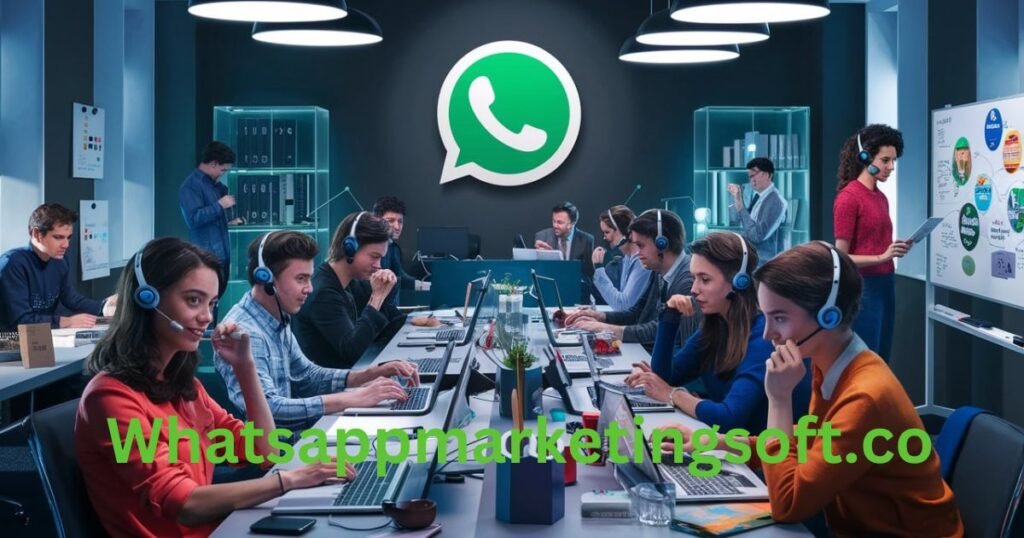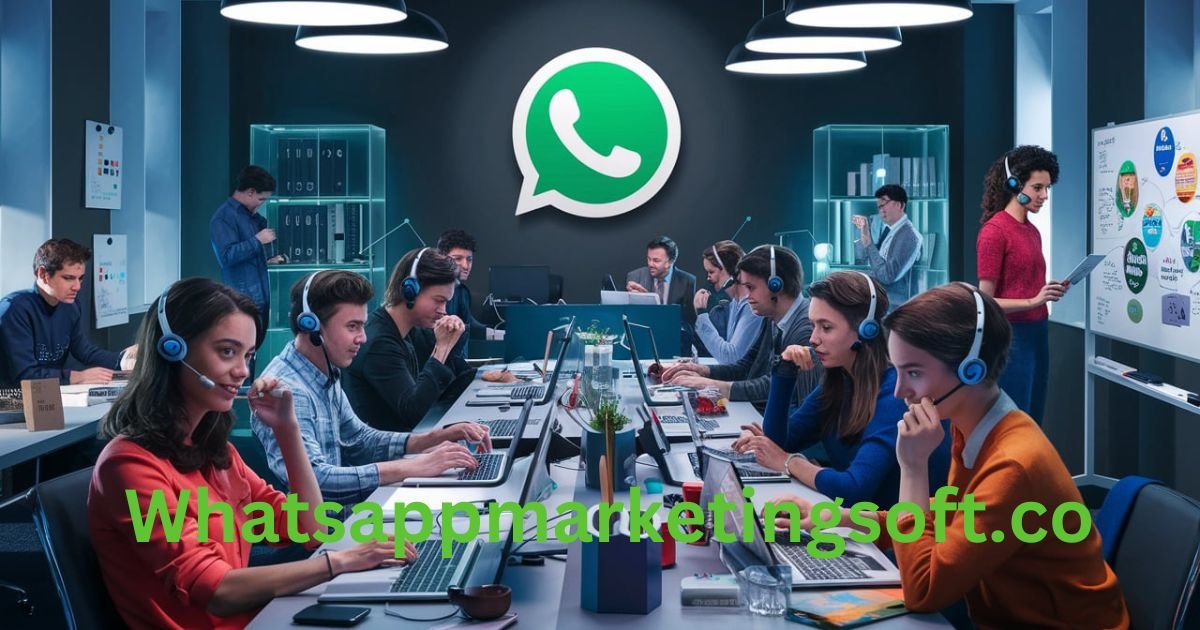Contents
- 1 Table of Contents
- 2 What is WhatsApp Marketing Software?
- 3 Benefits of WhatsApp Marketing Software
- 4 Choosing the Best WhatsApp Marketing Software
- 5 Creating a WhatsApp Marketing Strategy
- 6 Compliance and Best Practices for WhatsApp Marketing
- 7 How to Measure the Success of WhatsApp Marketing Campaigns
- 8 FAQs About WhatsApp Marketing Software
- 9 Conclusion
Table of Contents
Whatsappmarketingsoft.co In today’s fast-paced digital world, businesses need effective communication channels to stay connected with customers. WhatsApp has become one of the most popular messaging platforms globally, with over 2 billion active users. This makes it a crucial tool for businesses looking to tap into its extensive reach through WhatsApp marketing software.
This article will provide a detailed guide on WhatsApp marketing software, how it works, and how businesses can leverage it to enhance their marketing strategies.
What is WhatsApp Marketing Software?
Definition of WhatsApp Marketing Software
WhatsApp marketing software is a tool that enables businesses to automate, personalize, and manage their marketing campaigns using WhatsApp. It allows companies to send bulk messages, track delivery and response rates, create custom message templates, and integrate with CRM systems for a streamlined communication experience.
WhatsApp marketing software is particularly useful for businesses because it enables them to communicate directly with customers on a platform they are already using. By integrating this software into their marketing strategy, companies can send promotional messages, provide customer support, and enhance engagement with a large audience in a personalized and efficient way.
Features of WhatsApp Marketing Software
- Bulk Messaging: Send messages to thousands of contacts simultaneously.
- Automated Responses: Set up auto-replies for common queries.
- Multi-User Support: Allow multiple agents to manage customer conversations.
- CRM Integration: Sync with customer relationship management tools.
- Multimedia Support: Share images, videos, documents, and voice messages.
- Analytics and Reporting: Track the performance of campaigns with real-time data.
Benefits of WhatsApp Marketing Software
1. Cost-Effective Communication
Unlike traditional marketing methods such as SMS or email marketing, WhatsApp marketing can be more cost-effective. WhatsApp messages are sent over the internet, meaning there are no per-message costs as with SMS, and businesses can send unlimited messages at no additional charge.
2. High Engagement Rates
With an open rate of over 90%, WhatsApp ensures that marketing messages are seen and engaged with more than traditional email marketing. This significantly improves the chances of converting leads into customers.
3. Personalized Customer Interaction
WhatsApp marketing software allows businesses to create custom messages and personalized content, which leads to better customer engagement. By addressing customers by their names and offering personalized discounts or product recommendations, companies can foster stronger relationships.
4. Real-Time Communication
WhatsApp is a platform built for instant communication. Businesses can respond to customer queries or issues in real time, enhancing customer satisfaction and building trust.
Choosing the Best WhatsApp Marketing Software
1. Key Factors to Consider
When selecting WhatsApp marketing software, it’s essential to consider several key factors:
1.1 Scalability
Ensure the software can handle your current needs and can scale as your business grows. For instance, if you plan to target a large audience, the software must be able to send bulk messages efficiently.
1.2 CRM Integration
Seamless integration with CRM platforms is crucial for organizing customer data and tracking interactions. This helps in managing contacts and keeping communication records.
1.3 Automation Features
Look for software that offers automation features such as auto-replies, scheduled messages, and drip campaigns to streamline your marketing efforts and reduce manual workload.
1.4 Compliance with WhatsApp Business API
Ensure that the software is compliant with WhatsApp’s Business API guidelines to avoid any disruptions in service or potential bans.
2. Top WhatsApp Marketing Software in 2024
2.1 WATI (WhatsApp Team Inbox)
WATI is a robust WhatsApp marketing tool that enables businesses to send bulk messages, automate replies, and manage multiple conversations through a single interface. It integrates seamlessly with CRM systems and provides detailed analytics for tracking campaign performance.
2.2 WhatsApp Business API by Twilio
Twilio offers a powerful WhatsApp Business API that enables companies to send bulk messages, conduct two-way communication, and automate responses. It is widely used by large businesses for personalized marketing campaigns.
2.3 AiSensy
AiSensy provides an intuitive interface for creating WhatsApp marketing campaigns. It offers features like bulk messaging, chatbot integration, and automation, making it ideal for businesses of all sizes.

Creating a WhatsApp Marketing Strategy
Step 1: Define Your Objectives
Before diving into WhatsApp marketing, businesses must clearly define their marketing objectives. These can include:
- Brand Awareness: Promote new products or services.
- Lead Generation: Capture customer information through engagement.
- Customer Support: Provide 24/7 support using WhatsApp chatbots.
- Sales Promotion: Offer discounts or exclusive deals to WhatsApp contacts.
Step 2: Build a Contact List
Building an opt-in contact list is essential for WhatsApp marketing. Unlike email marketing, WhatsApp requires customers to opt in before receiving messages. You can grow your list by:
- Promoting your WhatsApp number on social media.
- Encouraging website visitors to subscribe.
- Offering incentives such as discounts for opting in.
Step 3: Personalize Your Messages
When sending messages via WhatsApp, avoid generic, mass-produced content. Use customer names, preferences, and purchase history to create personalized messages that resonate with your audience.
Step 4: Leverage WhatsApp Status
WhatsApp Status allows businesses to post updates that appear for 24 hours. Use this feature to share time-sensitive information, such as flash sales or product launches.
Step 5: Track and Optimize
Regularly monitor the performance of your WhatsApp marketing campaigns. Analyze metrics like open rates, click-through rates, and customer responses to optimize future campaigns. Use A/B testing to determine which message formats, times, and content work best.
Compliance and Best Practices for WhatsApp Marketing
1. Respect Privacy Regulations
Ensure that you are complying with local and international privacy laws, such as GDPR or CAN-SPAM, when using WhatsApp marketing software. This includes gaining consent from users to receive messages and offering opt-out options.
2. Avoid Spamming
Sending unsolicited messages is against WhatsApp’s policies. Always obtain explicit permission before sending marketing content. Overloading customers with too many messages can lead to complaints, blocking, or even account suspension.
3. Time Your Messages Appropriately
Ensure that you send messages at appropriate times to avoid annoying your customers. Sending promotional messages late at night or during holidays can result in negative engagement.
How to Measure the Success of WhatsApp Marketing Campaigns
Key Performance Indicators (KPIs)
1. Open Rate
The percentage of recipients who open your WhatsApp messages. With WhatsApp, open rates can be as high as 90%, making it a great platform for visibility.
2. Click-Through Rate (CTR)
Measure the percentage of people who click on the links in your messages. High CTRs indicate that your content is relevant and engaging.
3. Conversion Rate
The percentage of users who complete a desired action (e.g., making a purchase or signing up for a service) after interacting with your WhatsApp message.
4. Response Time
How quickly your business responds to customer inquiries is essential for improving customer satisfaction. Faster response times can lead to higher customer retention.
FAQs About WhatsApp Marketing Software
1. Can I use WhatsApp for free marketing?
Yes, businesses can use the WhatsApp Business app for free to communicate with individual customers. However, for advanced features such as bulk messaging, automation, and integration with CRM systems, companies typically need to use paid WhatsApp marketing software.
2. Is WhatsApp marketing legal?
WhatsApp marketing is legal, provided businesses follow privacy regulations and WhatsApp’s terms of service. Always ensure that you have obtained explicit consent from customers before sending marketing messages.
3. How do I get customers to opt in to WhatsApp messages?
You can encourage customers to opt in to WhatsApp messages by offering exclusive deals, early access to sales, or personalized content. Promote your WhatsApp number through various channels, including social media, email, and your website.
4. What is the difference between WhatsApp Business App and WhatsApp Business API?
The WhatsApp Business App is designed for small businesses to interact with individual customers manually. The WhatsApp Business API, on the other hand, is built for medium to large businesses and allows for automation, bulk messaging, and integration with other systems.
5. Can I send bulk messages on WhatsApp?
Yes, with WhatsApp marketing software, businesses can send bulk messages to a large number of contacts simultaneously. This feature is particularly useful for promotional campaigns and updates.
Conclusion
whatsappmarketingsoft.co software offers a powerful way for businesses to engage with customers, promote their products or services, and provide excellent customer support. With high open rates, cost-effective communication, and personalization options, WhatsApp can be an invaluable tool in a company’s marketing arsenal.
By selecting the right software, following best practices, and consistently measuring performance, businesses can maximize their WhatsApp marketing efforts, resulting in better customer engagement and higher conversion rates.





